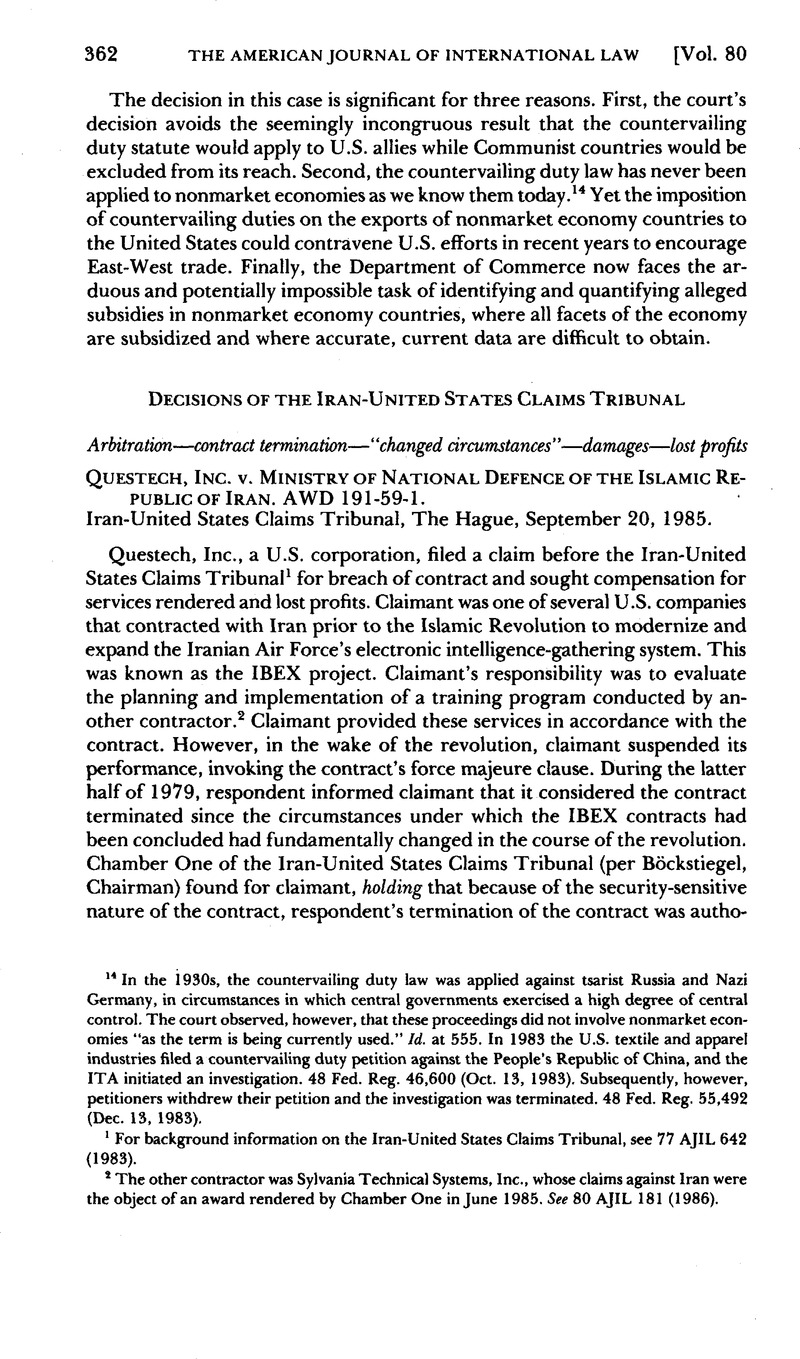No CrossRef data available.
Published online by Cambridge University Press: 27 February 2017

1 For background information on the Iran–United States Claims Tribunal, see 77 AJIL 642 (1983).
2 The other contractor was Sylvania Technical Systems, Inc., whose claims against Iran were the object of an award rendered by Chamber One in June 1985. See 80 AJIL 181 (1986).
3 AWD 191-59-1, slip op. at 17.
4 See Article 62 of the Vienna Convention on the Law of Treaties, May 23, 1969, UNTS Regis. No. 18,232 (entered into force Jan. 27, 1980), reprinted in 63 AJ1L 875 (1969) and 8 ILM 679 (1969). Article V of the Claims Settlement Declaration of Jan. 19, 1981, reprinted in 75 AJIL 422, 424 (1981), states: “The Tribunal shall decide all cases on the basis of respect for law, applying such choice of law rules and principles of commercial and international law as the Tribunal determines to be applicable, taking into account relevant usages of the trade, contract provisions and changed circumstances.”
5 Slip op. at 22.
6 Separate Opinion of Howard M. Holtzmann, AWD 191-59-1, slip op. at 7 (relying upon Restatement (Second) of the Foreign Relations Law of the United States §161(1965); Restatement of the Foreign Relations Law of the United States (Revised) §208 (Tent. Final Draft July 15, 1985)). Holtzmann does not discuss the Vienna Convention on the Law of Treaties.
7 Separate Opinion of Arbitrator Holtzmann, slip op. at 13.
8 Id. at 14.
9 AWD 191-59-1, slip op. at 23.
10 See Pomeroy, R. N. et al. v. Government of the Islamic Republic of Iran, AWD 50-40-3 (June 8, 1983)Google Scholar (Chamber 3); Pomeroy Corp. v. Government of the Islamic Republic of Iran, AWD 51-41-3 (June 8, 1983) (Chamber 3).
11 See Art. 62, para. 1(b) of the Vienna Convention, supra note 4.
12 Cf. Report of the International Law Commission to the General Assembly, [1966] 2 Y.B. Int’l L. Comm’n 172, 256–60, UN Doc. A/CN.4/SER.A/1966/Add.1. See in particular id. at 259, para. 10:
Some members of the Commission favoured the insertion of a provision making it clear that a subjective change in the attitude or policy of a Government could never be invoked as a ground for terminating . . . a treaty. . . . Other members, while not dissenting from the view that mere changes of policy on the part of a Government cannot normally be invoked as bringing the principle into operation, felt that it would be going too far to state that a change of policy could never in any circumstance be invoked as a ground for terminating a treaty. . . . The Commission considered that the definition of a “fundamental change of circumstances” in paragraph 1 [of Article 62] should suffice to exclude abusive attempts to terminate a treaty on the basis merely of a change of policy, and that it was unnecessary to go further into the matter in formulating the article.
See also United Nations Conference on the Law of Treaties, Official Records, First Session, Summary Records of the Plenary Meetings and of the Meetings of the Committee of the Whole 369–70, 372, UN Doc. A/CONF.39/11 (1969) (statements by Vallat and Harry, respectively).